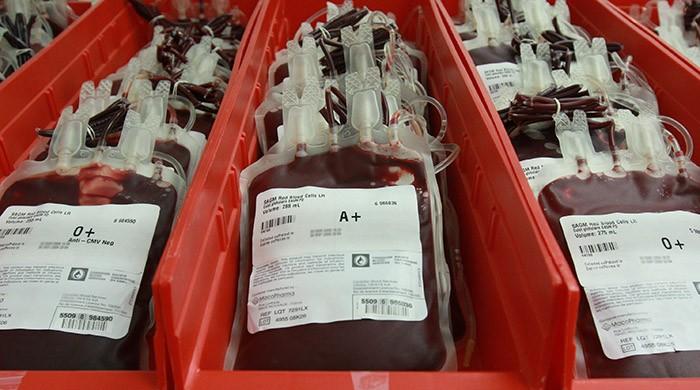
KARACHI: There has traditionally been a lack of voluntary blood donation culture in Pakistan, where thousands of patients in need of blood transfusions battle between life and death daily.
In such a scenario, ten state-of-the-art Centralised Blood Centres funded by the German government across Pakistan are a welcome addition to the health infrastructure in the country.
Four of these state-of-the-art fully equipped Regional Blood Centres (RBCs) have been set up in Sindh – one at Sindh Government Qatar Hospital in Karachi, and one each in Jamshoro, Sukkur and Nawabshah.
However, the provincial government has failed to operationalise these RBCs owing to inefficiencies and internal political tussles.
The German government, through its development bank KfW, provided 15 million euros (PKR 1.77 billion) grant to establish a safe blood transfusion system in all provinces of Pakistan, including the state of Azad Jammu & Kashmir. Of this budget, 5.4 million euros (PKR 637 million) were allocated to Sindh to help reduce the spread of transfusion-transmissible infections (TTI) caused by unsafe blood transfusions.
Under a separate agreement, the Sindh Department of Health and KfW agreed to make four RBCs operational via contracting out under the Public-Private Partnership Act, 2010.
However, the deadline (August 2016) to fully operationalise these RBCs has long passed.
A senior official in the Health Department, on condition of anonymity, said a report on the progress of the initiative declared the Sukkur Blood Bank technically disqualified. Hussaini Blood Bank and The Indus Hospital were declared technically qualified and got 77.5 and 82 technical scores out of 100, respectively. The Sukkur Blood Bank, however, received a score of only 27.
According to sources, the entire process has suffered due to politics, with the tender by the higher-ups at the Health Department getting re-initiated.
Dr Zahid Ansari, Director of Sindh Blood Transfusion Authority, confirmed that due to some technical issues the higher-ups of the department decided to re-initiate the tender.
Meanwhile, known organisations in the blood bank services sector were pressurised and even threatened with ‘blacklisting’. So this time around, only Sukkur Blood Bank was facilitated to submit the tender. Anticipating an embarrassing situation, the Secretary Health had to beg the Indus Hospital to submit its tender documents.
Asked about the re-tender and reception of the award to run the Sukkur RBC, Dr Muhammad Naeem, CEO of Sukkur Blood Bank, claimed that the ex-director of Public-Private Partnership did not give a good score to the blood bank as “we have 30 years of experience in blood disorders and blood banking”.
Dr Saba Jamal, Director of Indus Hospital, also confirmed that they received a call from the Health Department saying that due to unknown reasons, the first tender was embargoed by the government and a new tender would be processed shortly, after which the Heath Department awarded it to Indus Hospital.
According to Ex-Director Public Private Partnership Ehsanullah Wazir, the entire process of the qualification and scoring was conducted by non-technical committee members outside the bid validity period.
Director of Hussaini Blood Band, Dr Asad Ali said that “although we got the highest technical score, due to our board of governor’s decision we withdrew the contract.”
Meanwhile, Minister of Health Dr Sikander Ali Mandhro has assured he will probe the entire process.
At the same time, Karachi and Nawabshah RBCs will be put through a re-tender.
from GEO TV - Pakistan http://ift.tt/2DAssB4
Comments
Post a Comment